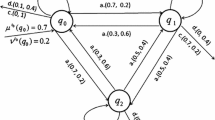Abstract
This paper establishes a fundamental framework of automata theory based on complete residuated lattice-valued logic. First it deals with how to extend the transition relation of states and particularly presents a characterization of residuated lattice by fuzzy automata (called ℓ valued automata). After that fuzzy subautomata (called ℓ valued subautomata), successor and source operators are proposed and their basic properties as well as the equivalent relation among them are discussed, from which it follows that the two fuzzy operators are exactly fuzzy closure operators. Finally anL bifuzzy topological characterization of ℓ valued automata is presented, so a more generalized fuzzy automata theory is built.
Similar content being viewed by others
References
Rosser, J. B., Turquette, A. R., Many-Valued Logics, Amsterdam: North-Holland, 1952.
Ying, M. S., A new approach for fuzzy topology (I) (II) (III), Fuzzy Sets and Systems, 1991, 39(3): 303–321; 1992, 47(2): 221–232; 1993, 55(2): 193–207.
Ying, M. S., Fuzzifying topology based on complete residuated lattice-valued logic (I), Fuzzy Sets and Systems, 1993, 56(3): 337–373.
Pavelka, J., On fuzzy logic I, II, III, Zeitschrf math Logik und Grundlagend Math, 1979, 25: 45–52; 119–134; 447–464.
Wang, G. J., Non-classical Mathematical Logics and Approximate Reasoning (in Chinese), Beijing: Science Press, 2000, 207–274.
Ying, M. S., Automata theory based on quantum logic. (I), Int. J. Theor. Phys., 2000, 39(4): 981–991.
Ying, M. S., Automata theory based on quantum logic. (II), Int. J. Theor. Phys., 2000, 39(11): 2545–2557.
Wee, W. G., On generalizations of adaptive algorithm and application of the fuzzy sets concept to pattern classification, Ph. D. Thesis, Purdue University, 1967.
Kandel, A., Lee, S. C., Fuzzy Switching and Automata: Theory and Applications, London: Grane Russak, 1980, 171–262.
Madan, M. G., George, N. S., Brian, R. G., Fuzzy Automata and Decision Processes, New York: North-Holland, 1977, 133–175.
Malik, D. S., Mordeson, J. N., Sen, M. K., On subsystems of a fuzzy finite state machine, Fuzzy Sets and Systems, 1994, 68(1): 83–92.
Das, P., A fuzzy topology associated with a fuzzy finite state machine, Fuzzy Sets and Systems, 1999, 105(3): 469–179.
Wang, S. Q., Lu, J. B., The ultraproduct basic theorems of lattice-valued models, Chinese Science Bulletin (in Chinese), 1981, 26(2): 71–74.
Author information
Authors and Affiliations
Rights and permissions
About this article
Cite this article
Qiu, D. Automata theory based on complete residuated lattice-valued logic. Sci China Ser F 44, 419–429 (2001). https://doi.org/10.1007/BF02713945
Received:
Issue Date:
DOI: https://doi.org/10.1007/BF02713945




